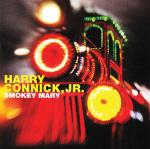Harry Connick Jr.’s first stab at a funk album, 1993’s She, coincided with the launch of his Krewe of Orpheus that year. The Krewe proved a popular addition to the Mardi Gras landscape… the album, not so much. Buy on AmazonBuy on iTunesIt was in fact a rather weird record, alternating party-friendly Carnival songs with darker shades of art-pop, well outside Connick’s comfort zone. He’s returned to funk a few times since—most successfully on the post-Katrina homage Oh My NOLA—but the suspicion has remained that Connick’s greatest gifts, the natural elegance in his jazz playing and his suave personality as a pop singer, aren’t that much use in a funkier format.
Does he finally master funk on Smokey Mary, his third full album in that style? Up to a point, yes. It’s a much better album than She, but a less ambitious one as well. Released in time for the Krewe’s 20th anniversary and named for its signature float, Smokey Mary is as close to spontaneous as it gets: The tracks all have a live-in-studio feel; the sound of real interplay and the absence of much studio gloss is a big plus. Connick let the album slip out without much promotion and without his label sending it to many record stores—granted, not that big a gamble in this day of Amazon and digital sales. He even threw on two old tracks, both from the ‘96 slicker Star Turtle (and both somewhat out of place here), to get a full-length disc out for Mardi Gras.
From start to finish, Smokey Mary sounds like a Carnival album—and more importantly, it feels like one. “S’posed to Be” starts as an upbeat duet with Tara Alexander; by the end they’re joined by trumpeter Mark Braud and a full gospel choir. Neither addition feels contrived, more like the guests heard a good groove and picked up on it. Connick’s not shy about referencing his sources: “Hurricane” is pure Meters (if a lot busier than any of their ‘60s sides) and “Angola (At the Farm)” harks back to early-‘60s Allen Toussaint. With an infectious tune and Sonny Landreth wailing on guitar, it may be Connick’s first full-fledged rock song. He doesn’t play a lot of solos this time around, but the ones he does take—notably a short, wild B3 on “The Preacher”—are quick and tasty. R&B still isn’t Connick’s natural vocal territory, but he sounds more relaxed here than before, and therefore more convincing. And the best songs—especially “Cuddina Done It” and “Wish I Were Him”—show him working his trademark charm into a grittier setting.
If anything’s missing it’s the moodier elements of his previous funk albums; uneven as they were, both She and Star Turtle suggested Connick was out to show a less familiar side of his personality and find his own, idiosyncratic take on R&B. If that doesn’t quite happen on Smokey Mary, it’s probably because everyone involved was having too good a time.





